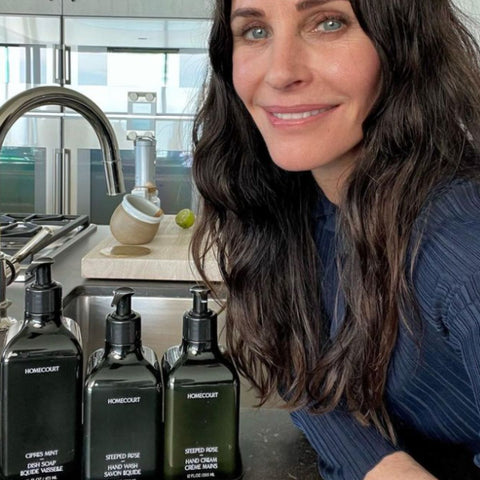Eco-Friendly Dish Soap: A Closer Look At Its Environmental Benefits
Written by Jazmine Roxas — September 28, 2023

Leading a sustainable lifestyle has become a crucial goal for many in today's world, especially as climate change and environmental degradation continue to escalate. While we often focus on major issues like transportation and energy consumption, the smaller aspects of our daily lives—like dishwashing—can also make a significant impact. This article aims to delve deep into the benefits of using eco-friendly dish soap and its role in safeguarding our environment.

Importance of Eco-Friendly Solutions
Journey to Waterways
When you wash your dishes and rinse off the soap, you probably don't think about where it goes after it disappears down the drain. But here's the thing: it doesn't just magically go away. It usually ends up in our waterways like rivers, lakes, and even oceans. Many traditional dish soaps contain harmful chemicals that are bad for water creatures and can disturb the natural balance of these ecosystems. Imagine a fish trying to survive in water that is filled with harsh chemicals—it's not a pretty picture.
State of Water Pollution
You might have heard about the crisis facing our water bodies. Our rivers, lakes, and oceans are suffering. They are jam-packed with pollutants ranging from chemical runoff from factories to plastic bottles and bags that never break down. Let us not forget untreated sewage that sometimes finds its way into the water. These factors make it even more crucial for us to take steps, no matter how small, to help combat this issue.
Key Benefits of Eco-Friendly Dish Soap
Reducing Chemical Footprint
One of the primary benefits of using the best eco-friendly dish soap is the significant reduction in the chemical footprint left in our water systems. Traditional dish soaps often contain harmful chemicals like phosphates and sulfates, which are not only harsh on the skin but also devastating to aquatic ecosystems. Phosphates, for example, lead to algae blooms that deplete oxygen in water bodies, endangering marine life. Eco-friendly alternatives are specifically formulated without these harmful substances. As a result, wastewater that flows into treatment plants is cleaner and simpler to process, enhancing the efficiency of water purification and reducing the overall environmental impact. By choosing these green products, consumers play a crucial role in protecting aquatic habitats and maintaining the natural balance of our water ecosystems.
Carbon Footprint
Choosing non-toxic dishwashing soap contributes directly to lowering your carbon footprint. These eco-conscious products are often manufactured using energy-efficient methods that minimize carbon emissions. The ingredients used are typically biodegradable and sourced sustainably, reducing the reliance on fossil fuels and lowering the overall environmental impact of the production process. By selecting these products, consumers are not only ensuring a safer cleaning experience at home but are also actively participating in the fight against global warming. These actions collectively contribute to a significant decrease in the release of greenhouse gases, thus mitigating the effects of climate change.
Impact on Aquatic Life
Eco dish soap is designed with the well-being of aquatic life in mind, aiming to create a healthier environment for fish and marine animals. These products avoid harsh chemicals that are commonly found in conventional dish soaps, which can lead to long-term damage to marine ecosystems, such as chemical poisoning of water species and disruption of reproductive systems. As emphasized before, by using readily biodegradable ingredients, plant-based dish soaps ensure that they break down naturally once washed down the drain, significantly reducing the risk of environmental toxicity.
Vital Components of Eco-Friendly Dish Soap
Biodegradable Ingredients
When a dish soap is labeled as biodegradable, it means that it can break down naturally and reintegrate into the environment without leaving behind harmful chemicals. Typically, these biodegradable dish soaps are made from natural plant-based materials, such as coconut oil, lemon, or aloe, which are not only gentle on the skin but also decompose easily when discarded. This characteristic is highly beneficial because it reduces pollution and the accumulation of toxic substances in the ecosystem.
Packaging Matters
In the quest for a more sustainable lifestyle, the packaging of products is equally as important as their contents. Many eco-friendly dish soap brands recognize this and have turned to innovative packaging solutions that emphasize sustainability. These alternatives often include recycled materials, biodegradable plastics, or even plant-based plastics that can decompose naturally. By choosing the most natural dish soap that comes in responsible packaging, consumers can help reduce the amount of waste that ends up in landfills and oceans. Moreover, sustainable packaging often requires less energy to produce and can be repurposed more effectively than traditional packaging materials.
Cruelty-Free
Cruelty-free products, especially eco-friendly dish soaps, play a crucial role in ethical consumerism. Obtaining a cruelty-free certification assures that the product and its components were developed without animal testing, reflecting a commitment to ethical standards and compassion.
- Humane Practices: Choosing cruelty-free dish soaps means supporting brands that uphold the ethical treatment of animals. These companies explicitly avoid any form of animal testing throughout their product development processes. This stance not only prevents the harm and suffering of animals but also sets a standard in the industry for humane product testing. Supporting such practices encourages others to reevaluate their testing methods and fosters an atmosphere where animal care is prioritized.
- Consumer Responsibility: By opting for cruelty-free dish soaps, consumers take a stand against the cycle of animal cruelty often seen in product testing. This choice reflects a broader commitment to ethical purchasing, where consumers understand their power to influence industry standards. Every purchase acts as a vote for practices that respect animal welfare and reject cruelty. This responsibility extends beyond personal benefit, contributing to a collective demand for products that align with compassionate values.
- Alternative Testing Methods: Cruelty-free products often rely on alternative, more humane testing methods such as in vitro tests, computer models, and clinical trials with human volunteers. These innovative approaches not only avoid unethical treatment of animals but often provide more relevant data on human safety and product efficacy. Companies that use these cutting-edge methods embrace scientific innovation and ethical norms while producing safer and more efficient goods.
- Market Influence: When consumers choose cruelty-free products, they encourage more companies to adopt these practices, thus broadening the market for ethically produced goods. This demand leads to increased investment in cruelty-free research methods, fostering a competitive environment where companies innovate to meet ethical expectations. Over time, this influence can shift industry norms, making cruelty-free certification a standard rather than an exception, thereby enhancing the ethical profile of the market.
This choice has far-reaching effects, prompting companies to innovate and adhere to ethical practices, which ultimately benefit both animals and humans alike. By fostering this ethical marketplace, we can expect a future where cruelty-free products are the norm, reflecting our societal values and ethical progress.

Absence of Toxins
Mainstream dish soaps often contain a variety of chemicals such as phosphates, parabens, and synthetic fragrances, which can cause skin irritation, and allergic reactions, and have detrimental effects on the environment. Non-toxic dish soaps, on the other hand, use ingredients that are safe for both humans and the planet. These soaps ensure that the runoff water from your dishes does not pollute waterways or harm aquatic life. Additionally, toxin-free soaps contribute to a healthier indoor environment by reducing the risk of exposure to harsh chemicals during dishwashing. Consumers looking to protect their health and contribute to a healthier environment should seek out labels that guarantee the absence of these harmful substances.
Energy-Efficient Production
Energy-efficient production processes are key to reducing the environmental impact of manufacturing dish soaps. Eco-friendly brands often invest in production methods that use less energy and generate fewer greenhouse gases. This can include using renewable energy sources, such as solar or wind power, to fuel production facilities. Energy-efficient production often involves optimizing manufacturing processes to reduce waste and improve efficiency, such as through better heat integration or advanced machinery that requires less power to operate. By reducing the energy footprint of production, these companies not only lessen their impact on climate change but also set a standard for responsible manufacturing practices in the industry.
Transitioning to Green Solutions
Read the Labels
Manufacturers are required to list ingredients and provide other product details on labels, which can be complex and filled with technical jargon. However, familiarizing yourself with common environmental claims such as "biodegradable," "recycled content," or "non-toxic" can guide you toward making more informed decisions. It is also important to distinguish between vague marketing terms like "green" or "eco-friendly" and specific, regulated terms that may have more credibility. Reading labels thoroughly also involves looking for information about the product's origin, production practices, and energy efficiency. By becoming proficient in reading and interpreting these labels, consumers can avoid greenwashing and choose products that offer genuine environmental benefits.
Understand Certifications
Eco-certifications serve as trusted indicators, provided by impartial organizations, to evaluate products against specific environmental and social standards. These certifications play a critical role in guiding consumers toward more ethical and sustainable purchasing decisions.:
- Leaping Bunny: This certification ensures that no animal testing is used in any phase of product development by the company, its laboratories, or suppliers. The Leaping Bunny Program, managed by a coalition of animal protection organizations, sets a high standard for cruelty-free status. Companies must regularly recommit to the certification and may be subject to independent audits. The stringent verification process provides consumers with the assurance that products carrying the Leaping Bunny logo adhere to the most rigorous cruelty-free standards.
- USDA Organic: Products bearing the USDA Organic seal comply with strict production and processing standards set by the U.S. Department of Agriculture. These standards include avoidance of synthetic chemicals, irradiation, and genetically modified organisms. Organic certification requires rigorous onsite inspections and detailed documentation processes to ensure that all aspects of production adhere to organic protocols. In addition to attesting to adherence to these guidelines, this certification encourages sustainable farming methods that improve the quality of the soil and water, lower pollution levels, and foster ecological balance.
- Fair Trade: The Fair Trade certification signifies that the product meets international standards that focus on social and economic equity for workers and farmers. Certified products must come from producers and businesses that adhere to a set of criteria that includes fair labor practices, equitable pricing, and sustainable community development. Fair Trade Certified labels also indicate that extra funds from purchases go directly back into the local communities where the goods were produced, funding important projects such as educational programs, healthcare services, and infrastructure improvements.
Recognizing these certifications not only helps consumers make informed choices but also drives demand for ethically produced goods, encouraging companies to adopt more sustainable and humane practices.
Proper Disposal
Proper disposal of product packaging is a crucial step in minimizing environmental impact. Many soap containers, for example, can be recycled, composted, or even upcycled, depending on their materials. Before disposing of any packaging, it's important to check with local waste management authorities to understand the specific recycling guidelines and facilities available in your area. Some materials may require special handling or can only be processed at certain recycling centers. Consumers can explore creative ways to reuse or upcycle containers, such as turning them into plant pots or storage containers, which extends the life of the packaging and reduces waste. Being mindful of disposal methods and adhering to local regulations can ensure that their environmental footprint is as small as possible, contributing to a more sustainable ecosystem.

Broader Implications
Collective Effort
While using eco-friendly dish soap may seem like a small step, it's a part of a larger collective effort. Small changes in our day-to-day lives can contribute to the bigger picture of global sustainability.
Setting an Example
Adopting sustainable practices in your household chores can inspire others to do the same. Your choice of nontoxic dishwashing soap or kitchen surface cleaner can be an example of someone else needing to make the switch.
As our planet continues to bear the brunt of unsustainable practices, opting for environmentally friendly alternatives in every area of our lives becomes increasingly important. Products like the best sustainable dish soap or even related products like the best organic hand creams and eco-friendly hand creams not only protect your health but also contribute to a healthier planet. Now is the time to make the switch for a cleaner, more sustainable future. With informed choices, each one of us can contribute to a more sustainable and environmentally friendly world.